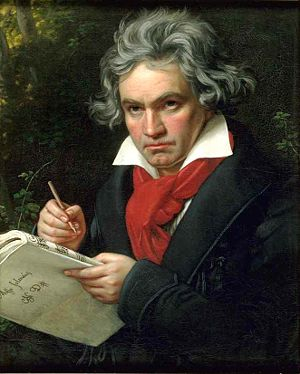The Well-Tempered Ear
Classical music: Is there more to say about Beethoven and his music? Acclaimed musicologist Jan Swafford thinks so, and says so in his new biography of The Ludwig. | August 9, 2014
By Jacob Stockinger
By most polls and surveys, the most popular composer of classical music remains Ludwig van Beethoven (below). The surly, willful and influential musician bridged the Classical and Romantic eras, and his music retains much of its power and universal appeal even today.
All you have to do is mention the names of works in virtually all the various musical genres and forms — solo sonatas, chamber music, symphonic music, concertos, vocal music — that Beethoven mastered and pushed into new realms of expression:
The “Eroica” Symphony.
The Fifth Symphony.
The “Pastoral” Symphony.
The Ninth Symphony with its “Ode to Joy.”
The “Emperor” Concerto for piano.
The “Razumovsky” and “Late” String Quartets.
The “Ghost” and “Archduke” piano trios, and the “Triple” Concerto.
The “Moonlight,” “Pathetique,” “Tempest,” “Appassionata,” “Waldstein” and “Hammerklavier” piano sonatas.
The “Spring” and “Kreutzer” violin sonatas.
The “Missa Solemnis.”
“Fidelio.”
And on and on.
Such nicknames and so many! Talk about iconic works!
What more is there to be said about Beethoven?
Well, quite a lot, apparently, according to the acclaimed music historian Jan Swafford (below), who did his undergraduate work at Harvard University and his graduate work at Yale University and who now teaches composition and music history at the New England Conservatory of Music.
Swafford, who has also written biographies of Johannes Brahms and Charles Ives, has just published his 1,000-page biography of Beethoven with the subtitle “Anguish and Triumph.”
It is getting some mixed or qualified reviews. But before you look into that, better check into the pieces that NPR (National Public Radio) did on Swafford and his takes on Beethoven, some of which defy received wisdom and common sense.
Here is a summary of some common perceptions about Beethoven that may -– or may NOT –- be true, according to Swafford. It i s an easy and informative read.
http://www.npr.org/blogs/deceptivecadence/2014/08/05/337857557/ask-us-anything-about-beethoven
And here is another piece on NPR’s Deceptive Cadence blog that deals with how the powerful Symphony No. 3 “Eroica” reveals Beethoven’s personality. (You can hear the opening, played by the Vienna Philharmonic under Leonard Bernstein, in a YouTube video at the bottom.)
http://www.npr.org/2014/08/03/336656578/beethovens-eroica-a-bizarre-revelation-of-personality
Some critics have questioned whether the book (below) is too long, whether it repeats things that are already well known and whether the writing style is accessible to the general public.
But nobody is ignoring it.
Here are two reviews by reputable media outlets.
From The Wall Street Journal:
http://online.wsj.com/articles/book-review-beethoven-anguish-and-triumph-by-jan-swafford-1406927297
From The New York Times:
http://www.nytimes.com/2014/08/03/books/review/beethoven-by-jan-swafford.html?_r=0
Have you read Jan Swafford’s other work?
What do you think of his music histories and biographies?
Or of his new Beethoven book, if you have read it?
And what is your favorite work by Beethoven?
The Ear wants to hear.
Tags: Appassionata, Archduke Trio, Arts, Beethoven, Chamber music, Charles Ives, choral music, Classical, Classical music, concerto, Emperor Concerto, Eroica Symphony, Fidelio, Fifth Symphony, Ghost Trio, Hammerklavier, Harvard, Jacob Stockinger, Jan Swafford, Kreutzer Sonata, Ludwig van Beethoven, Missa Solemnis, Moonlight Sonata, Music, musicology, National Public Radio, New England Conservatory, New York Times, Ninth Symphony, NPR, Ode to Joy, Pastoral Symphony, Pathetique Sonata, Piano, Piano Trio, Romantic, Romantic music, sonatas, Spring sonata, String quartet, Swafford, symphony, Tempest Sonata, Violin, Waldstein, Wall Street Journal, Yale, Yale University, YouTube
7 Comments »



[…] By Jacob Stockinger By most polls and surveys, the most popular composer of classical music remains Ludwig van Beethoven (below). The surly, willful and influential musician bridged the Classical and Romantic eras, and … […]
LikeLike
Pingback by Classical music: Is there more to say about Bee... — May 30, 2015 @ 2:57 pm
Eroica starting is awesome
LikeLike
Comment by beethovensschool — August 29, 2014 @ 3:28 am
[…] Classical music: Is there more to say about Beethoven and his music? Acclaimed musicologist Jan Swaf… […]
LikeLike
Pingback by Ludwig van Beethoven – Symphony No. 6 in F major, op. 68 “Pastorale”: make music part of your life series | euzicasa — August 18, 2014 @ 9:23 am
[…] Classical music: Is there more to say about Beethoven and his music? Acclaimed musicologist Jan Swaf… […]
LikeLike
Pingback by Classicly In Love | Unspoken Truths — August 17, 2014 @ 8:44 am
It’s nuts to try to pick a “favorite” but if pressed right at this moment I’d opt for the String Quartet in C# minor, Op 131 of which Schubert remarked, upon hearing it, “What else is left for us to write?”
LikeLike
Comment by Marius — August 10, 2014 @ 7:45 pm
That is completely understandable. The Ninth is great music that forever changed the course of music history, especially the symphony.
But as I get older, I find I am more and more attracted to small-scale Beethoven — the violin sonatas, the cello sonatas, the piano trios and the early string quartets.
They too are very powerful but often have an intimacy that I miss in the bigger works with certain exceptions such as the Piano Concerto No. 4.
But there is plenty of Beethoven to satisfy all tastes, even though these days I generally lean more toward Schubert.
But that is another story for another time.
Thanks for reading and replying.
Jake
LikeLike
Comment by welltemperedear — August 9, 2014 @ 12:03 pm
My favorite Beethoven work is still the 9th Symphony, the bass trombone part of which is a great challenge but also love many of his piano sonatas.
LikeLike
Comment by buppanasu — August 9, 2014 @ 11:07 am